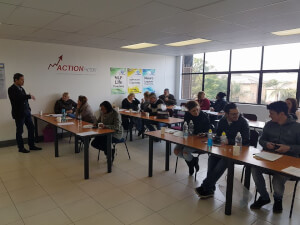The Disconnect with International Investors. I get a lot of inquiries from people in Zimbabwe who are looking for investors for their projects and I also meet many international investors who would like to figure out how to make a play at investing in Africa but they lack information and are afraid of risk. I also interact with many fund managers who have a war-chest of money to spend in Africa but they can’t find the right kind of deals. Most private equity investors do not invest in Greenfield projects or start-ups. They like to come in at a later stage and they invest in companies whose management teams have a good track-record. PE fund managers looking to fund mezzanine deals, for instance, struggle to find suitable companies in Africa. The other issue is that certain sectors like mining or oil and gas are viewed as being really profitable so since fund managers are looking to make the highest return so they concentrate on these sectors.
Some fund managers especially institutional investors are restricted to investing in publicly-listed companies so in Africa that means they look at the big bourses like the Johannesburg, Nigeria and Nairobi stock exchanges. A lot of the entrepreneurs I meet in Zimbabwe and elsewhere in Africa are really looking for venture capital or seed capital. Most venture capitalists are really focused on local companies because most start-ups need a lot of mentoring in the early stages so even in the US VC are concentrated in certain regions of innovation like Silicon Valley for the tech and North Caroline for the biotech industry. It’s hard enough to get a VC to fund in a start-up in New York City, for instance, never mind to get them to come to Africa. There are a few social investment vehicles out there that will look at Africa but mostly they will fund non-profit incubators to promote the use of technology abroad.
Business Development Companies, a Model for Africa.
So where does that leave us here in Zimbabwe? Apart from frontier market risk, Zimbabwe is also viewed as having high political and regulatory risk although thankfully the EU has lifted sanctions recently so it will be a while before we see the big money flowing in. The mining industry is Zimbabwe is popular with investors but other industries such as manufacturing and services present opportunities. Private equity funds are sniffing around the country but the challenge with private equity is that the minimum investment is at least $500,000 and the investors are locked in for an average of 10 years so you need investors with long pockets and very patient capital to take a position on any PE deal. To even make an investment, the PE manager has to trust that you will return their money and make them a decent return! Due to the global financial crisis, many PE funds in the US, line Blackstone, are publicly listing business development companies (BDCs) where the minimum investment is $2,000 and the exit through the stock market provides liquidity for investors.
This is a practical model for an African country like Zimbabwe to raise money for investment for various projects. The challenge is how to list a vehicle on the local bourse where the listing requirements often require companies with 5 years of financials. The Zimbabwe Stock Exchange, like many other bourse in Africa including the NSE, is preparing to set up an alternative exchange for small and medium enterprises, SMEs. A public listing of a BDC will raise capital to invest in many sectors in Zimbabwe where opportunities abound such as real estate, textiles, manufacturing and services. When you list a BDC, you are selling management expertise in the same way you do in a PE fund so you need an experienced team that will take the funds and invest them wisely to bring high returns to investors. A public listing is also preferable because the BDC’s stock price will be correlated to the company’s performance as investors will head for the doors if they don’t like the company’s strategy.
Africa Can’t Wait for International Investors to Rescue Us
Even at the darkest hour of hyperinflation, the Zimbabwe Stock Exchange has always been robust and this is because it does not rely just on international investors. It is a market that is open to everyone including locals to build wealth. Through investor education and marketing, it is possible to bring the masses to invest in the stock market to build wealth. There is a lot of talk about empowering the masses and eliminating poverty but the bulk of most countries’ economy is on their stock markets and when you look at countries like South Africa and Zimbabwe, black people are not participating in the stock market I large numbers. In an effort to comply with the mandatory Black Economy Empowerment (BEE) requirements some South African companies have tried to issue separate BEE public issues through the post offices, etc but they are still struggling to bring the masses buy shares.
Black people are interested in growing their money too but they are just not familiar with the stock market. Any place you go you will find women forming skoevels or su-sus where they collect money to give to one member in turns so there is a hunger to invest money but they have not been given the tools for modern investing such as the stock market. When I worked in the US, almost all my white colleagues had a financial planner whom they sat with at least once a year to plan how to invest their money for the future. I believe that the public markets are the means for African countries to develop their economies. What I don’t like is that most of the value on the stock markets is held by institutional investors alone such as pension funds. Every time there is a new listing the institutional investors grab the lion’s share and this is good for the brokers who don’t have to sweat to sell share but there is no diversity in the investor bases. In the US or Europe individual investors count for a sizeable number of investors on the stock market but the retail investor market in Africa is really nascent.
There hasn’t been a new listing on the ZSE in about a decade and a new listing will be taken up easily but I am keen to target first-time investors to bring them into the market because long term they provide the market for whatever goods or services companies invest in anyway. Reaching new investors will be tougher because it will involve a lot of education through the media outlets. I like the idea of involving investors by investing in sectors that benefit them. For instance, commercial real estate brings benefits to a large sector of the community so by building malls in the areas where investors live and buying companies will create jobs for them. It sounds a bit like a social enterprise but what is wrong with making money with a business that actually benefits its community? But like with all things, there has to be a starting point so when the new exchange in the second part of the year there will be opportunities for SMEs to raise money. There is no shortage of investment opportunities in Zimbabwe.
The Industrial Development Company of Zimbabwe and they had a bunch of companies on their books which have been looking for investors for years. I have a strong interest in empowering women so one of the sectors I like is the garment industry because it is a great employer of women. Zimbabwe used to have a burgeoning textile industry with companies like David Whitehead, Julie White and Fashion Enterprises, most of whom have gone out of business so there is an opportunity to re-equip the plants and produce clothing for export. China is beset with pollution problems and producing there is becoming expensive so the international fashion chains like H&M and Zara are looking to African countries such as Ethiopia to produce their clothes. Added to this the AGOA act allows clothing from Africa to come into the US tax-free so big retailers like Walmart present another opportunity. The real estate industry is a big employer of women and projects virtual offices with franchises like Regus Suites would work well in Zimbabwe. Furnished, serviced, executive apartments such as South Africa’s Don Suites would do well in Harare where there is a large diplomatic, NGO and expatriate communities particularly if they are located in the right suburbs of Zimbabweans such as Newlands. All of these would employ the large numbers of women searching for employment in Zimbabwe.
Finally it’s really important to tap into international networks to find investors who really have an attachment to Zimbabwe because it is easier to sell them an idea. There are people that I have done business with who want to invest in Zimbabwe but they need to deal with people they trust. I recently found out that one of my friends, who is with an oil company in Nigeria, spent his honeymoon in Zimbabwe 18 years ago and he would love another opportunity to visit the country. Many people have positive associations with Zimbabwe and would like an opportunity to do business here but the international media has done a good job of scaring them. The basic infrastructure is more or less intact and we have a well-educated workforce. There are many factors that make Zimbabwe an excellent investment destination so we need to work on the image issue.






This is awesome”I can call it strong stuff”